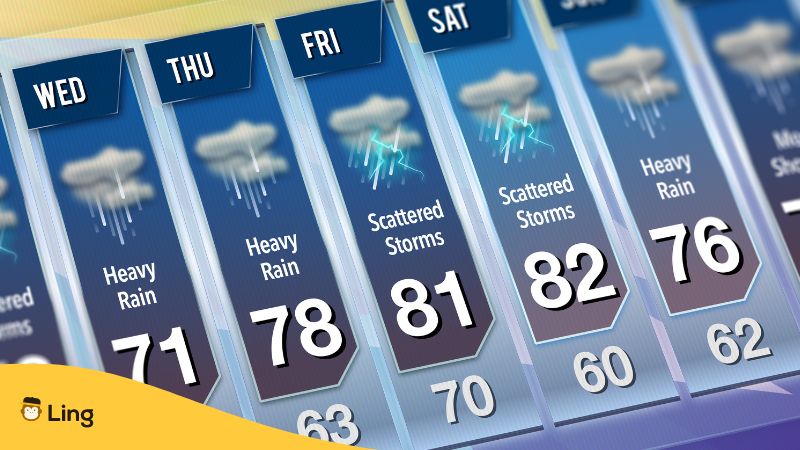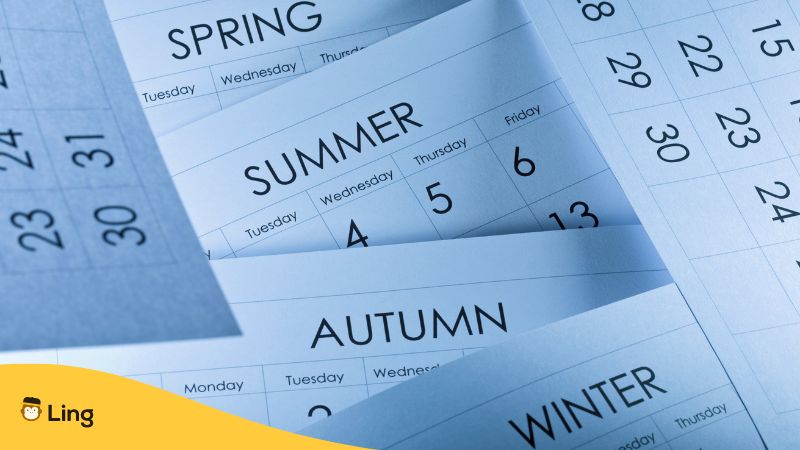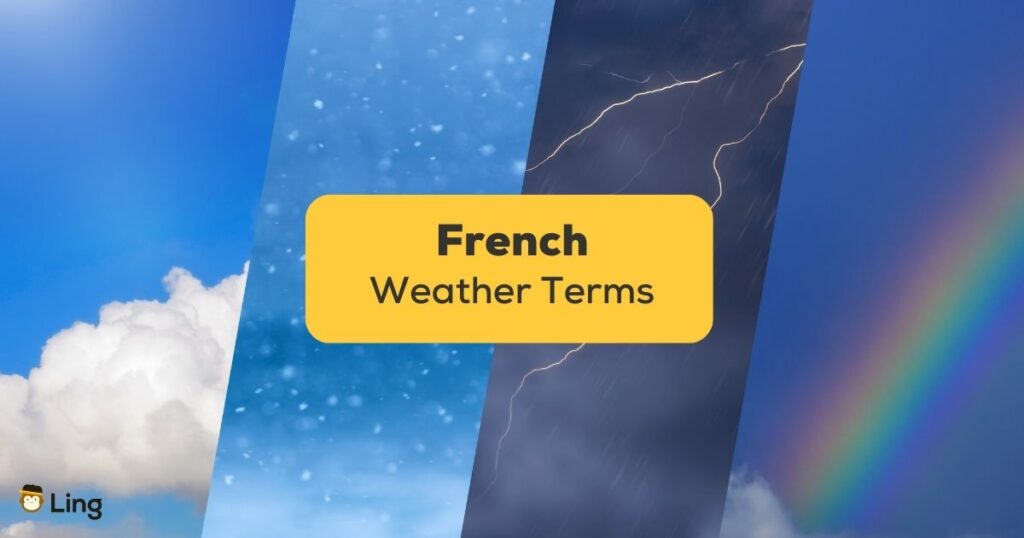Imagine you’re strolling through the enchanting streets of Paris, a fresh baguette in hand, when suddenly dark clouds gather overhead. Is it a sign from the weather gods? Well, whatever it is, learning basic French weather terms will surely not hurt! So in this article, we’ll shower you with all the meteorological expressions that’ll have you dancing in the rain and soaking up the sun like a true blue Parisian. Let’s begin!
Ah, Paris!
The mere mention of the name conjures up images of romance, art, and croissants that melt in your mouth. My love affair with the City of Light began long before I set foot on its charming cobblestone streets. As a Filipino who enjoyed the early 2000s, I was one of the lucky few who developed a sudden love for France when the hit Koreanovela, Lovers In Paris, was aired in the primetime slot. I vividly recall eagerly rushing home after school to immerse myself in the tale of an endearingly unlikely couple falling head over heels. At that moment, a seed was planted within me, and I knew deep within my heart that one day, I would visit the land that had captured my imagination.
When I finally had the chance to visit Paris, the flame within me grew into an inferno. The moment I laid eyes on the city’s iconic landmarks, such as the Louvre and Notre Dame, I felt an indescribable connection. The air seemed charged with artistic inspiration, and I couldn’t help but get lost in the labyrinth of streets, each one offering a new glimpse into the city’s rich history and vibrant present.
But little did I know, I was about to encounter a surprise in the form of Parisian weather, or as the French say, “le temps.” While I had heard that summers in Paris are typically fleeting, I was unprepared for the unforgiving cold that awaited me. It felt as if I had unwittingly transformed into the Pillsbury Doughboy, bundling up in layers upon layers of clothing just to brave the elements.
To add to my bewilderment, it seemed that the universe had conspired against me as the pilot announced during the flight that the weather forecast wasn’t particularly favorable. The irony was not lost on me; it was simply a case of lost-in-translation as I hadn’t fully comprehended the gravity of the situation beforehand. Now, that’s something I don’t want you to experience! That’s why I created this post for you. So without further ado, let’s start discussing the French weather terms you need to master before your flight!

Basic French Weather Terms
Before we embark on our linguistic journey into the realm of French weather expressions, let’s equip ourselves with some essential basic weather vocabulary. These phrases will serve as the building blocks for our meteorological exploration, enabling us to engage in captivating conversations about the ever-changing skies.
| English | French |
|---|---|
| The weather | Le temps |
| The weather forecast | La prévision météorologique |
| It’s nice weather | Il fait beau |
| It’s bad weather | Il fait mauvais |
| It’s hot | Il fait chaud |
| It’s cold | Il fait froid |
| It’s raining | Il pleut |
| It’s snowing | Il neige |
| The wind | Le vent |
| The sun | Le soleil |
| The rain | La pluie |
| The snow | La neige |
| The cloud | Le nuage |
Now that we have familiarized ourselves with essential French weather vocabulary, let’s explore some basic sentence patterns that will allow us to use these words in context. By understanding these sentence structures, we can effectively communicate our observations, preferences, and experiences related to the weather.
Here are a few of my favorite examples:
- Subject + Verb + Weather Expression
- The weather is beautiful. (Le temps fait beau.)
- It’s raining. (Il pleut.)
- It’s hot today. (Il fait chaud aujourd’hui.)
- The sun is shining. (Le soleil brille.)
- Subject + Verb + Adjective + Noun
- I feel cold. (Je me sens froid.)
- They seem happy in the rain. (Ils semblent heureux sous la pluie.)
- She appears tired on cloudy days. (Elle a l’air fatiguée les jours nuageux.)
- Question Word + Verb + Subject + Weather Expression
- What is the temperature today? (Quelle est la température aujourd’hui?)
- Where is the wind coming from? (D’où vient le vent?)
- When will it stop raining? (Quand est-ce que ça va arrêter de pleuvoir?)
Talking About Temperature In French
What is your favorite temperature? Personally, I love it when it’s super chilly outside! In the case of France, temperatures can vary greatly depending on the season and region. Summers can be pleasantly warm (not like my usual Asian type of summer), with average temperatures ranging from 20 to 30 degrees Celsius (68 to 86 degrees Fahrenheit). On the other hand, winters can be chilly, with average temperatures ranging from 0 to 10 degrees Celsius (32 to 50 degrees Fahrenheit).
When engaging in weather-related conversations, it’s essential to have the ability to discuss temperature with ease. Understanding the nuances of temperature descriptions allows us to navigate discussions about the ever-changing French climate. From the scorching summers to the crisp winters, France experiences a wide range of temperatures throughout the year. So, let’s equip ourselves with the vocabulary to express these temperature variations accurately.
| English | French |
|---|---|
| The temperature | La température |
| The degree | Le degré |
| Hot | Chaud |
| Cold | Froid |
| Heatwave | La canicule |
| Freezing | Le gel |
| Coolness | La fraîcheur |
Describing Rainy Weather
Rainy weather has a unique charm of its own, and being able to describe it adds depth to our conversations about the French climate. In France, rain showers can be quite common throughout the year, so it’s essential to have the vocabulary to express and navigate discussions about rainy weather. Let’s explore some phrases that will help us describe rainy conditions in both English and French:
| English | French |
|---|---|
| Rain | La pluie |
| Drizzle | La bruine |
| Downpour | L’averse |
| Thunderstorm | L’orage |
| Lightning | L’éclair |
| Umbrella | Le parapluie |
| Water drop | La goutte d’eau |
Describing Sunny And Cloudy Weather
From basking in the warm embrace of the sun to marveling at the poetic dance of clouds, describing sunny and cloudy weather allows us to paint vivid pictures of atmospheric wonders. In France, sunny and cloudy weather can create a delightful tapestry of moods and experiences. Let’s explore some phrases in English and French that will help us effectively describe these weather conditions:
| English | French |
|---|---|
| Sun | Le soleil |
| Heat | La chaleur |
| Heatwave | La canicule |
| Light | La lumière |
| Sky | Le ciel |
| Cloud | Le nuage |
| Cloudy | Nuageux |
| Sunny | Ensoleillé |
| Sunset | Le coucher de soleil |
Extreme Weather Conditions
While France is known for its picturesque landscapes and temperate climate, it can also experience extreme weather conditions that demand our attention and preparedness. From fierce storms to natural disasters, being able to discuss these situations is essential. Let’s explore some phrases in English and French that will help us navigate conversations about extreme weather conditions:
| English | French |
|---|---|
| Hurricane | L’ouragan |
| Storm | La tempête |
| Tornado | La tornade |
| Blizzard | La tempête de neige |
| Earthquake | Le tremblement de terre |
| Flood | L’inondation |
| Drought | La sécheresse |

Seasonal Vocabulary In French
The changing seasons bring a delightful shift in the French landscape, each with its unique charm and atmospheric character. To fully appreciate the beauty of nature’s transformation, let’s explore some seasonal vocabulary in both English and French:
| English | French |
|---|---|
| Spring | Le printemps |
| Summer | L’été |
| Autumn/Fall | L’automne |
| Winter | L’hiver |
| Snow | La neige |
| Leaves | Les feuilles |
| Flower | La fleur |
| Temperature | La température |
| Wind | Le vent |
Weather-related Idioms In French
Idioms add color and depth to any language, and French is no exception. Let’s explore some popular weather-related idioms in French that will not only enhance your language skills but also provide interesting insights into the French culture:
| Meaning | French | Literal Translation |
|---|---|---|
| To have the wind in one’s sails | Avoir le vent en poupe | To have the wind in one’s sails |
| It’s raining heavily | Il pleut des cordes | It’s raining ropes |
| To be in the fog | Être dans le brouillard | To be in the fog |
| It’s terrible weather | Il fait un temps de chien | It’s dog weather |
| It’s extremely bad weather | Il fait un temps à ne pas mettre un chien dehors | It’s weather not to put a dog outside |
| To get a sense of what’s going on or gather information | Prendre le vent | To take the wind |
Learn The French Language With Ling
Now that you’ve delved into the world of French weather vocabulary, idioms, and basic sentence patterns, it’s time to put your newfound knowledge into practice. Engage in conversations about the weather with your French-speaking friends, impress them with your ability to describe different weather conditions, and use idioms to add a touch of French flair to your language skills.
Remember, learning a language is a journey, and practice makes perfect. So, don’t hesitate to immerse yourself in French culture, watch French movies, listen to French music, and seek opportunities to converse with native speakers. The more you practice, the more confident you’ll become in expressing yourself in French.
If you’re eager to take your French language learning to the next level, consider using language learning platforms like Ling. Ling provides comprehensive resources, interactive lessons, and personalized guidance to help you master French and unlock the doors to a whole new world of communication and cultural understanding. Download it now for FREE from the App Store or Play Store!



































































